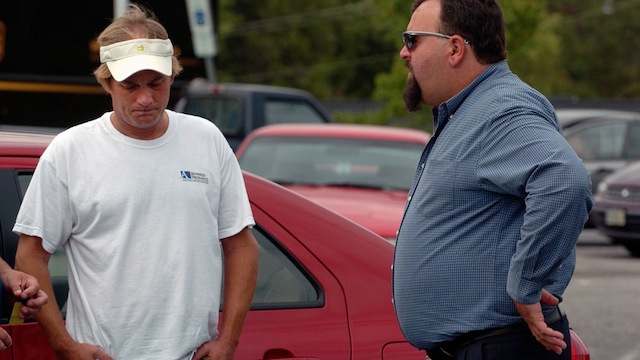 Back to selection
Back to selection
Sundance 2015: The Bronze, The Summer of Sangaile and Finders Keepers
 Finders Keepers
Finders Keepers If you’re feeling generous, you might pat the programmers on the back for trying their luck with a raunchy comedy like The Bronze in one of the opening night slots of the Sundance Film Festival. But if you’re feeling frank, you may just go ahead and call this overlong Olympic satire from first time director Bryan Buckley for what it is: a solid, third tier effort.
Co-writer Melissa Rauch stars as Hope Ann Gregory, some kind of Kerri Strug has-been who spends her days snorting pills and masturbating in her father’s basement to a languishing VHS tape of her bronze victory decades prior. When she hits the town of Amherst, Ohio in her USA tracksuit and high (faux) ponytail, she’s shaking down everyone from the pharmacist to the Sbarro cashier at the mall for a celebrity discount. Rauch and her co-writer husband Winston Rauch go for broke on the ‘unlikeable protagonist’ spectrum at the film’s start, resulting in a string of one-note one liners that cloak Gregory’s icy, broken interior in adolescent meltdowns.
Fed up with her attitude and general state of unemployment, Gregory’s postman father informs her that her recently deceased coach has left her $500,000 on the sole stipulation that she train the town’s young star gymnast to Olympic victory. Begrudgingly, she takes the gig, first trying to sabotage the girl, then warming to the role of mentor. Everything from then on out is pretty much textbook: the nebbish love interest — “Twitchy,” who, yes, has a twitch; the smoldering rival coach, who at least gifts us the film’s genuinely hilarious sex scene; the anxieties of irrelevancy, and so forth, all wrapped up in the yellow brick road to self-redemption. I’d be lying if I said The Bronze doesn’t get some good jokes in, but it is self conscious in a way that suggests a hearty laugh is the be all and end all. Occasionally, Rauch allows herself to modulate the high-register performance into something that is still crass yet enjoyable, but it’s not long before the redundant gross out phrases come raining out of her mouth.
Just purchased by Relativity for $3 million, The Bronze should nevertheless fare well commercially, with its clearly defined audience in the wings, and frankly, given the average blockbuster bromance alternative, there are worse things that could happen. If I was more forgiving of The Bronze than most, it’s perhaps largely because it followed the World Dramatic opener, The Summer of Sangaile.
Operating under the assumption that mood music plus lengthy gazes plus alternately picturesque and leering camerawork equals romance, Alanté Kavaïté presents a straining film without a cohesive, narrative framework. Sangaile is a waif of a girl who spends her summer at air shows when she’s not bleeding out of her forearms courtesy of some trusty mathematical instrument. Rescuing her from her purported depression is Auste, an overbearing, older girl whose bedroom includes grating oddities like a chair taped to the ceiling. Auste is an amateur designer, who proceeds to seduce Sangaile with her custom clothes and photoshoots that take place throughout the Lithuanian countryside.
Despite the budding relationship, Kavaïté and the talented cinematographer Dominique Colin work to convey an unrest in Sangaile with sky high subjective camerawork that suggests her competing vertigo and escapism. It is this vertigo that prevents Sangaile from fulfilling her dream to be a pilot, but you’d never really know what this impassive character’s desires are since they are scarcely expressed — rather, it is Auste who randomly prods her into the cockpit. What should thus build towards a traditional coming-of-age high upon the conquering of fears merely leaves one cold, as any semblance of internal passion isn’t conveyed by either the actress’s performance or Kavaïté’s script, which prefers to channel its energy into sex scenes involving tutus and christmas lights.
Aviation takes on quite a different, more completist role in Bryan Carberry and Clay Tweel’s bizarro documentary, Finders Keepers. A pure slice of stranger-than-fiction Americana, Finders concerns the North Carolina case of John Wood and Sharron Whisnant, a have and have not, as they wage a custody battle over the latter’s foot. An amputee as a result of a plane crash that killed his father, Wood descended into drugs and debt as he left his leg (from the calf down) to rot in a grill in a storage unit. Through a strange series of events, culminating in an auction, Wood’s foot ended up in the possession of the money-grubbing Whisnant, who relished the fame and fortune someone else’s body part brought him, and refuses to go quietly into this surreal legal tug of war.
Though the film does rely a little too much on talking head confessionals from the Wood and Whisnant families, the indelible characters and their surrounding story are unexpectedly textured as Wood’s foot takes on a bevy of conceits. At Finders‘ center are two broken — albeit, very entertaining — men desperate to make something of themselves, whether righting familial wrongs or chasing the bright bulbs of a television camera only to have it laugh in their faces. Carberry and Tweel do a capable job of riding the film’s tonal swings, often laughing with their characters but rarely at them.
